Loneliness is Widespread
LONELINESS IS WIDESPREAD IN THE US (UK and JAPAN) – MORE DATA AND IMPLICATIONS
A blog in 2018 about loneliness in the US is further confirmed by more data released recently (https://kkf.org/ed080e1 ). The Kaiser Family Foundation, in collaboration with the Economist magazine surveyed adults in the US, UK, and Japan to gather data about loneliness, isolation, and a lack of companionship:
- In the US, 22% of adults report “…they often or always feel lonely, feel that they lack companionship, feel left out, or feel isolated from others, and many of them say their loneliness has had a negative impact on various aspects of their life.” In the UK, the percentage is 23%, while in Japan it is 9%. Contrary to “common wisdom” that isolation is an issue primarily for the elderly, more than half those feeling lonely – in each country – are under 50 years old. They are more likely to be divorced or single as well.
- Across the three countries, the people reporting loneliness are also “….more likely to report being down and out physically, mentally, and financially.” In scanning the previous few years, many people who are lonely experience a loss in their financial situation, a serious injury, or a serious illness. Of those who are lonely, 30% report having thoughts of self-harm.
- Lonely people have fewer close confidants, and fewer friends or relatives living nearby who are dependable for support. Many lonely people in the US or UK do speak to their friends or relatives by phone or in person with some frequency, as contrasted with those in Japan, where communication with friends or relatives is reported to be less frequent.
- In the US people are about evenly split as to whether loneliness is an individual problem or a public health problem. Most people see individuals and families as a primary solution for the challenge; about one-fourth see a major role for government in addressing this issue. In contrast, majorities of people in the UK and Japan see the issue as a public health one, with government intervention seen as a major part of the solution along with individual/family efforts.
- Slight majorities of people in the US and UK see technology as a contributing factor to social isolation. By contrast, 27% of people in Japan see increased technology use contributing to isolation.
- Japanese people experiencing loneliness are more likely to say the issue is severe, compared to the US and UK, and also report that the issue is more long-lasting (more than 10 years). And, more of the Japanese are younger than 50, compared to the US and UK.
Expanding on the health impact of loneliness, research now identifies increases in “inflammation, dementia and death rates.” More specifically, lonely people generate more stress hormones in their bodies, which directly cause the inflammation (highly correlated to heart disease, cancers, and other illnesses). And people who are more lonely are less likely to go to their physicians, to be compliant with medication regimens, or to exercise or eat in more nutritious ways. Loved ones may “nag us”, but they also tend to support healthier life style choices (https://www/nytimes.com/2019/11/09/opinion/sunday/britain-loneliness-epidemic.html ).
Psychotherapy of course is one more source of support for healthier choices, including helping clients reduce their isolation and loneliness. Many clients, especially when dealing with depression and/or anxiety benefit significantly from active support for healthier life style choices – nutrition, exercise, sleep habits, reducing social isolation.
Alan M. Solomon, Ph.D. is a clinical psychologist in private practice in Torrance, CA. A member of the Independent Psychotherapy Network, he can be reached at 310 539-2772 or dralanms@gmail.com
Copyright 2019 by Alan M. Solomon, Ph.D.

